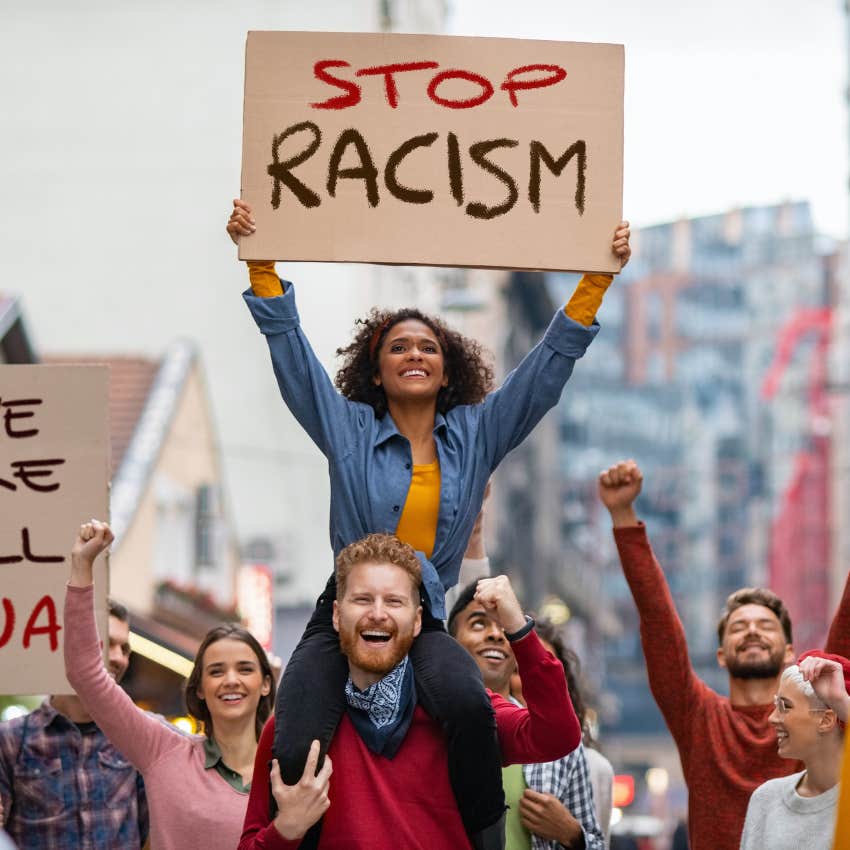11 Things Gen Z Thinks Are Completely Unforgivable That Older Generations Couldn't Care Less About
Gen Z didn't start cancel culture, but they have embraced it whole-heartedly.
 Andrii Iemelianenko / Shutterstock
Andrii Iemelianenko / Shutterstock Every generation has its own moral compass, shaped by the world they grew up in. For Gen Z, born between the late 1990s and early 2010s, that world has been one of rapid change, increased global connectivity, and a heightened awareness of injustice, inequality, and mental health. Because of their extremely particular mindset, there are many things Gen Z tends to view as completely unacceptable, even when people from older generations often don’t see them as a problem at all.
While people in older generations may not always understand the intensity of Gen Z’s belief in their values, many of the things that Gen Z views as non-negotiable are rooted in real, long-term social consequences. They don't believe these aren't passing trends, but rather deeply held convictions about how people should treat each other and the planet.
1. Racism and gender inequality, even in subtle forms
 Rido via Canva
Rido via Canva
Gen Z is deeply aware of how both overt and subtle racism and gender inequality shape everyday life. They are quick to call out comments, behaviors, or media that reinforce stereotypes, regardless of intent.
Older generations sometimes dismiss these concerns as overreactions, but Gen Z sees them as part of a larger pattern that needs to be addressed, not ignored. They tend to prioritize the lived experiences of marginalized groups, and they expect others to do the same.
Addressing bias isn't seen by Gen Z as political correctness, it's considered essential to progress. They also believe that silence in the face of racism or gender discrimination is complicity, and that everyone has a role to play in challenging systemic discrimination.
2. Misgendering and disrespecting pronouns
For Gen Z, using correct names and pronouns isn’t optional, it’s a matter of basic respect. Gender identity is something they recognize as complex and personal, and they expect others to treat it that way as well.
Older people may not understand this level of sensitivity or may struggle with terminology, but Gen Z sees misgendering as harmful and unacceptable. Inclusion starts with language, and for Gen Z, adapting to people’s identities is not an inconvenience, it’s a reflection of empathy.
This is especially true in educational and workplace environments, where inclusivity is a top priority. They also believe that using correct pronouns fosters a sense of safety and belonging for everyone, while people in older generations may not believe that is either possible or entirely desirable.
3. Climate change denial or apathy
Gen Z considers climate change one of the most serious issues facing humanity, and they expect individual people, companies, and governments to act decisively and transparently in order to fix the problem. People in older generations, especially those raised before the climate crisis was widely discussed, may see these concerns as extreme or exaggerated, but for Gen Z, inaction feels like a direct threat to their future.
Sustainable living, clean energy, and green innovation are priorities for this generation, and they're more likely to support businesses and politicians who take the issue seriously. Climate inaction isn’t just frustrating for them, it’s viewed as irresponsible.
Many also feel a sense of eco-anxiety, fueling a demand for long-term solutions rather than temporary fixes.
4. Ignoring mental health needs
 martin-dm via Canva
martin-dm via Canva
Gen Z is much more open about discussing mental health and seeking help when needed than previous generations were. They view therapy, medication, and self-care not as weaknesses, but as important parts of life.
People in older generations often avoided these conversations due to stigma or a belief that emotional struggles should be handled privately. Gen Z disagrees and expects workplaces, schools, and families to support mental well-being openly.
They’re advocating for mental health days, accessible counseling, and de-stigmatized conversations across all settings. The expectation is not just awareness, but structural support. They also call for mental health coverage to be considered as important as physical health in public policy.
5. Refusing to learn or change harmful behavior
One of Gen Z’s core values is the belief that people should be open to growth and accountability. Saying, “That’s just how I was raised,” or, “I didn’t know” is no longer considered a valid excuse.
Older generations sometimes see this as overly critical, but Gen Z views active learning and unlearning as essential in today’s world. They value humility and effort over perfection, and expect people to take initiative in educating themselves.
A failure to adapt often signals a lack of empathy or effort in the eyes of Gen Z. Growth is celebrated, but stubbornness in the face of harm is not forgiven easily.
6. Making jokes at the expense of others
Humor that targets marginalized groups is something Gen Z largely rejects. Even if it was once socially acceptable, Gen Z believes that causing harm through jokes is not excusable.
Where older generations might prioritize free speech, Gen Z emphasizes empathy and the impact that words have. They appreciate comedy that’s thoughtful, inclusive, and doesn’t rely on stereotypes. Punching down is no longer seen as edgy, it’s just outdated. Satire, irony, and self-deprecating humor are welcome, but not when they reinforce prejudice or dismiss others' experiences.
7. Supporting unethical brands
Gen Z tends to research the companies they buy from, looking for transparency around labor practices, environmental impact, and inclusivity. If a brand doesn’t align with their values, they’re quick to move on.
Older consumers may prioritize convenience or affordability, but Gen Z believes their money should support ethical business practices. Boycotts and call-outs are common tools they use to push brands toward greater accountability. Ethical consumption isn’t just a trend, it’s a standard. This generation often views their spending as a form of activism and brand loyalty must be earned.
8. Lack of representation in media
Gen Z expects to see a full spectrum of race, gender, and ability represented in film, television, and advertising. They are critical of industries that fail to reflect the diversity of real life. Older generations often accepted homogeneous media without question, but Gen Z is pushing for inclusion not as a bonus, but as a baseline.
They believe that representation not only reflects reality but shapes it, influencing how people see themselves and each other. Media that fails to reflect that diversity often feels disconnected or unrelatable to Gen Z.
They also recognize the importance of representation behind the camera, advocating for diverse voices in storytelling roles.
9. Dismissing social justice movements
Movements like Black Lives Matter, MeToo, and indigenous rights aren’t political to Gen Z. They are moral issues. They expect people to be informed, vocal, and aligned with human rights. People in older generations sometimes view these topics as divisive or overly complicated, but Gen Z sees silence or neutrality as complicity.
They seek out institutions and leaders who are actively engaged in social justice. Passive support is not enough. Gen Z values action. They believe that allyship means showing up, speaking out, and using privilege to elevate others.
10. Telling people to be grateful instead of addressing injustice
 U Ozel Images from Getty Images Signature via Canva
U Ozel Images from Getty Images Signature via Canva
Gen Z is focused on systemic change, not individual tolerance. They don’t accept being told to stop complaining or to be thankful for opportunities that come with unfair barriers. Older generations sometimes interpret this kind of critique as entitlement, but Gen Z believes in speaking up instead of staying quiet to keep the peace.
They do believe gratitude and accountability can coexist. Acknowledging progress doesn’t mean ignoring what still needs to change. For Gen Z, complacency isn't an option when change is both necessary and possible.
11. Online harassment and public shaming
Gen Z grew up in a digital world and understands the emotional toll of cyberbullying and targeted harassment. They view online cruelty as just as harmful as real-life bullying. Where older generations may brush it off as not that serious, Gen Z takes digital ethics and personal boundaries seriously and expects platforms and individuals to do the same. They advocate for digital safety, responsible platform moderation, and mental health protections online.
Their goal isn't censorship, but respectful communication. Digital spaces should be safe, constructive, and inclusive for all users.
Gen Z holds people, brands, and institutions to a high standard, not out of a desire to cancel anyone, but out of a desire to create a more thoughtful and equitable world. These values may seem intense to older generations, but they reflect a broader shift toward accountability, empathy, and collective responsibility.
Cultural values are always evolving. Gen Z is simply leading the next wave.
Sloane Bradshaw is a writer and essayist who frequently contributes to YourTango.

